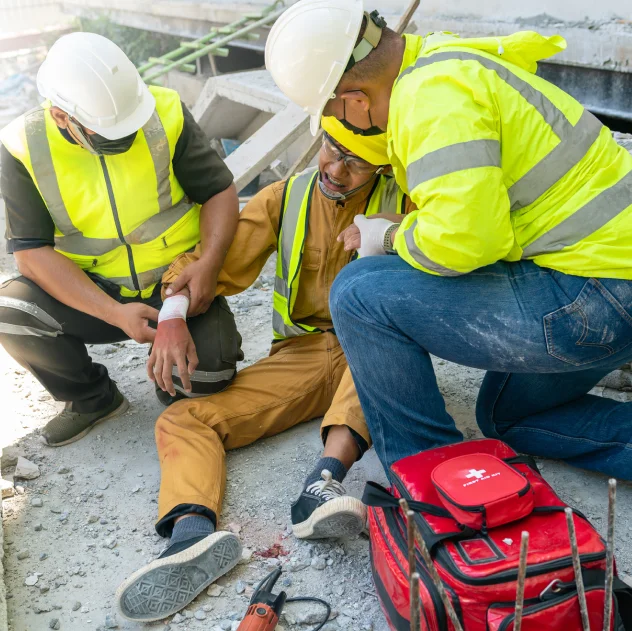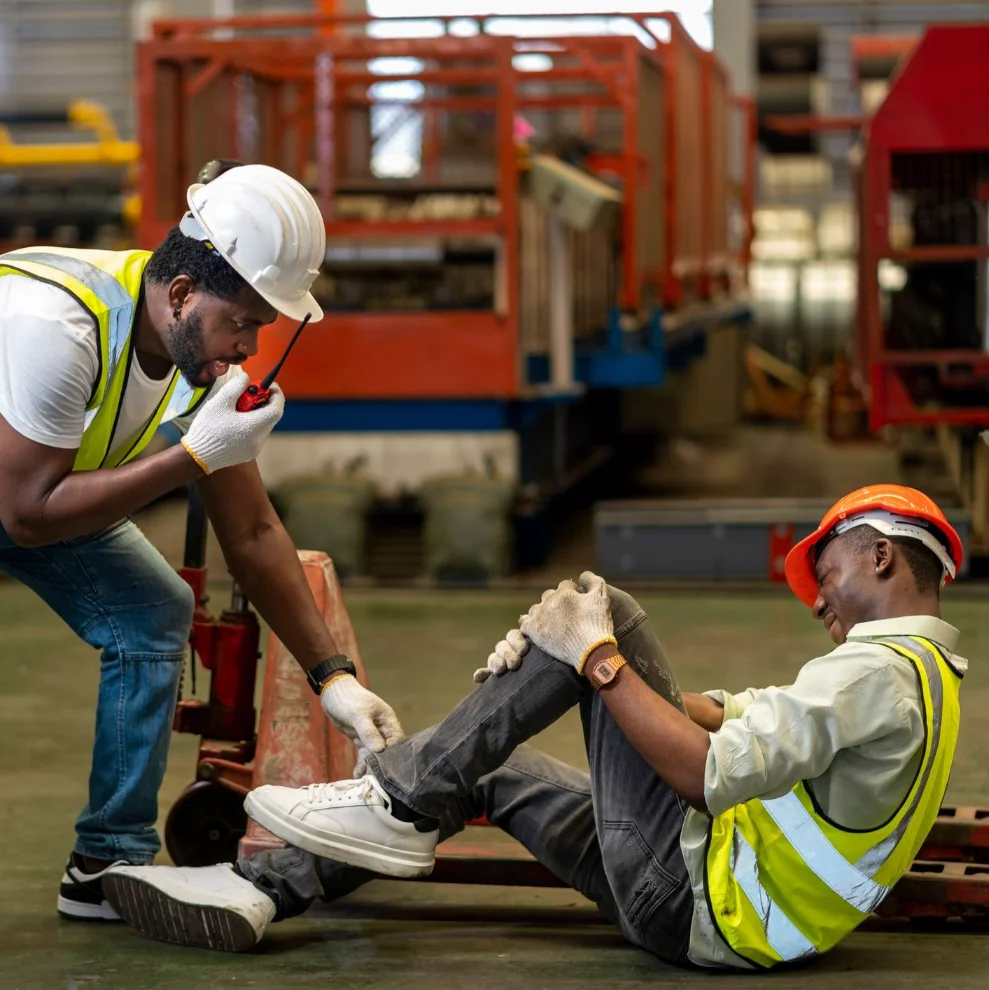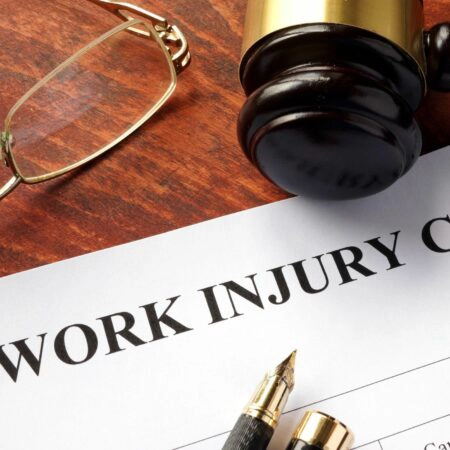Falling object injuries can be devastating for workers and their families. Call our firm today if you’ve suffered a falling object injury at work and need help accessing your workers’ compensation benefits.
Falling object injuries can range drastically in seriousness depending on the circumstances. They can happen at any time, in any place, to anyone, regardless of occupation. In 2023, falling object injuries doubled from the previous year, and contributed to 4% of occupational fatalities in California.
If you or a loved one has been injured or killed due to a falling object at work, you may be entitled to workers’ comp benefits. Call James Koh, workers’ compensation attorney, for a free consultation.
Common Injuries Caused By Falling Objects
Falling object accidents can result in minor bruising or much more severe conditions such as traumatic brain injuries or even coma. Some common falling object injuries include:
- Head injuries
- Facial injuries
- Neck and spinal injuries
- Shoulder injuries
- Arm and hand injuries
- Leg and foot injuries
- Internal injuries
- Soft tissue injuries
- Psychological trauma
In some cases, falling objects can even result in death. If you are the surviving loved one of an individual killed in a workplace falling object accident, you may be entitled to workers’ compensation, and possibly damages.

Where Do Falling Object Injuries Occur?
Simply put, any person can sustain a falling object injury at work regardless of their occupation. Most commonly, however, the workers listed below are most at risk for falling object injuries:
- Construction workers: This includes individuals working on scaffolding, rooftops, or at various levels of a construction site where tools, materials, or debris can fall.
- Warehouse workers: Those involved in stocking, organizing, or retrieving items from high shelves are at risk of objects falling from overhead storage areas.
- Manufacturing workers: Employees in factories or production facilities may encounter falling objects during material handling, assembly processes, or when machinery malfunctions.
- Dockworkers: Individuals loading or unloading cargo from ships, trucks, or trains may experience injuries from falling containers, equipment, or goods.
- Forestry workers: Those involved in logging, tree trimming, or forestry operations are susceptible to injuries from falling branches, trees, or equipment.
- Roofers: Professionals working on roofs or elevated surfaces face risks of tools, materials, or debris falling from above.
Keep in mind that you don’t necessarily need to be a laborer to be at risk for falling object injuries. Retail workers getting hit in the head with a heavy object on a stock shelf or a range vent falling down on a line cook during a lunch rush can also result in serious injury.
How Do Falling Object Injuries Occur?
Even among the most safety-prepared job sites, you’ll still find many incidents of falling object injuries. Here are some common reasons that they might occur:
- Unsecured Objects: Objects not properly secured or stored may fall due to vibrations, gusts of wind, or accidental contact. For example, tools, materials, or equipment left on elevated surfaces without proper containment or restraint can easily fall.
- Overhead Work: Work being conducted above ground level, such as construction, maintenance, or repair activities, can inadvertently dislodge objects that then fall onto workers below.
- Stacked or Piled Items: Items stacked improperly or piled too high can collapse, leading to objects falling onto individuals nearby. This scenario commonly occurs in warehouses, construction sites, or storage areas.
- Equipment Failure: Malfunctioning equipment such as cranes, hoists, or rigging systems can drop loads unexpectedly, causing objects to fall and potentially injure workers.
- Human Error: Accidental dropping or mishandling of objects by workers can result in falling object incidents. This may happen due to fatigue, distraction, lack of training, or improper use of equipment.
- Unsafe Work Practices: Failure to follow safety protocols, such as not wearing personal protective equipment (PPE) such as hard hats, ignoring safety warnings, or disregarding proper procedures for storing and handling objects, can increase the risk of falling object injuries.
What To Do If You’re Struck By A Falling Object
The first thing you need to do if you’ve been hit by a falling object at work is seek immediate medical attention. Whether you were hit on the head, neck, back, or appendages, and regardless of the type of object that fell on you, it’s essential to not only your health but also your workers’ comp claim to see a medical professional for your injury. Failing to do so may result in a worsening of your condition, especially in cases of concussion (or other head injuries), neck injury, or back injury.

Filing A Workers’ Compensation Claim
Once you’ve been seen by a medical professional, you’ll have 30 days to contact your employer to tell them about your injury. Ideally, they will provide you with all the necessary paperwork and information you need to file a claim. Even if they don’t, you can find this information on the California Department of Industrial Relations website.
Once your claim is submitted, you will eventually be contacted by a representative of your employer’s workers’ compensation insurance company. Unfortunately, this isn’t always a pleasant experience for claimants. It’s not unheard of for insurance representatives to use manipulative tactics in order to get claimants to admit fault. This is why hiring a workers’ compensation lawyer is crucial in these types of injury cases as they’re able to communicate with insurance providers and employers on your behalf.

Compensation For Falling Object Injuries
If your claim is approved, you’ll receive compensation for your medical expenses. If your doctor recommends a recovery period of at least four days, you will be compensated for your missed wages while you recuperate. You should also be compensated for any type of physical therapy deemed necessary by your doctor. Lastly, if you’re a surviving spouse or family member or the deceased worker killed by a falling object, you may be eligible for compensation for funeral expenses.
Liability for Falling Object Injuries
While determining liability is important in personal injury cases, it’s important to know that you’ll likely be ineligible to sue if you decide to file for workers’ compensation. However, certain factors may allow you to sue.
If you were injured by a falling object, or your loved one has become incapacitated or deceased due to a falling object accident, you may be able to file a personal injury claim if:
- A third party (other than an employer or co-worker) was involved in causing the accident
- The employer or co-worker intentionally dropped an object on the injured worker
- The employer has no workers’ compensation insurance
- The employer committed fraud by lying about the injured employee’s accident, claim, or rights
If these factors represent your case, you and your lawyer can discuss your options for a personal injury suit, and whether or not filing both claims would be beneficial.
Hire a California Workers’ Compensation Lawyer for Your Falling Object Injury
Between the recovery time, communication with insurance companies, medical professionals, and your employer, and filing paperwork at the required deadlines, navigating a workers’ compensation claim can sadly be a frustrating and emotionally exhausting process. Even if your claim is approved, many claimants still face many challenges including late or inaccurate workers’ comp checks, annoying phone calls from the insurance companies, and workers’ comp doctors who don’t seem to work with you.
Call James Koh for a free consultation. We are ready to help you navigate the workers’ comp system.
Contact Us
If you or a loved one have been injured in an accident, whether at work or elsewhere, contact us to handle your personal injury and workers’ compensation claims.